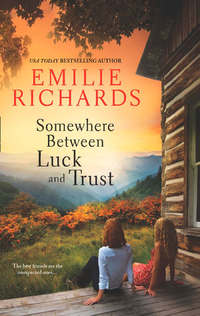
Полная версия
One Mountain Away
Analiese thought just how fitting the flowers must be, then, and how Minnie’s many friends had planned it that way. “I haven’t seen the arrangements. I was just on my way up front to check and make sure everything’s set up correctly before I robe.”
“I didn’t know about a memorial service. Is it a church member?”
“Not a member, no. But a church as large as ours was needed to hold this one.”
“Somebody important, then.”
Analiese nodded. “Yes, she was important.” She paused, then plunged. “The service is for a woman named Minnie Marlborough.”
Charlotte’s expression didn’t change, but she was suddenly still, because certainly the name was familiar to her. “Minnie Marlborough died?”
“Last week.”
“I’m sorry, I’ve been out of town for a while. I didn’t know. Had she been ill for long?”
Analiese couldn’t figure out how to answer that. From the moment she had seen Charlotte’s car, she had known this conversation might be necessary, although she hadn’t been sure Charlotte would remember Minnie. Now she was just as confused about the direction to take as she had been before she murmured her prayer in the parking lot.
“I don’t know how to answer that,” she said after a long pause. “I don’t know what you want me to say. I can tell you the truth, or I can tell you some version that’s easier to hear.”
“I remember the first time I heard you speak in our pulpit—I was overwhelmed by your honesty.” Charlotte paused, but not long enough to allow Analiese to respond. “But I was also fascinated.”
“Were you?”
“At the time you had to know you were destroying your chances of being called as our pastor, but that didn’t stop you from telling the truth, exactly the way you saw it.”
“Here I am, anyway,” Analiese said, “ten years later, and both of us completely baffled about how it happened.”
“I voted against you.”
“I assumed.”
Charlotte rubbed an eye, a gesture that was out of character for a woman who gave the impression she wouldn’t flinch under torture. “So do what you do best, and please tell me the truth.”
“Minnie never adjusted to life in town.”
Charlotte waited for more, but Analiese shrugged. “I’m sorry, it’s that simple. Her little farm, her animals? They were all she had. When they were gone, she didn’t have anything left to live for. At least that’s what her friends say.”
“You blame me for that.” It wasn’t a question.
“I’m your minister. It’s not my place to blame you, Charlotte. I wasn’t even sure you’d remember her.”
“And what about the woman Analiese Wagner. Does she blame me?”
“I wish I could separate the two that easily.” Analiese turned the question around. “What about the woman Charlotte Hale? How does she feel?”
Charlotte spoke slowly, as if she were putting memories together. “Minnie Marlborough’s farm was needed for a retirement facility that would benefit hundreds of seniors and has. Her neighbors wanted to sell when they heard our terms. We thought everyone would come out ahead. The city’s richer for the taxes the facility pays. The road’s been widened and improved, so residents in the area benefited, too.”
We, Analiese knew, was Falconview Development, of which Charlotte Hale was the founder, president and CEO.
She thought carefully before she spoke, struggling to be fair. “I know you or someone at Falconview found her an apartment where she could have some of her things—”
“I knew how much she loved those animals. I got the owner to lift the restrictions on pets so she could bring the two cats she’d had the longest,” Charlotte said, although not defensively.
“And found homes for almost all the rest who were healthy. I know.”
“Did you ever see her house? Ever walk around the grounds? Every penny Minnie Marlborough had from Social Security and savings went to those animals she took in. And she was such an easy mark. Somebody’s cute little kitten started clawing the furniture and suddenly Minnie found a new pet on her doorstep. She could never say no, and everybody knew it. I was told the house was falling down around her. I doubt she ate as well as the animals she fed.”
Analiese thought carefully before she spoke. “I think the hardest decisions are the ones where we’ll reap benefits from only one of the outcomes. How can we remain objective?”
“I guess you’re saying I didn’t.”
“I’ve been told Minnie had friends who went to that house every day to help. They brought food and took animals to the vet, and helped her find homes for everything from iguanas to llamas. I’m told that for every person who took advantage of her, there was another who reached out to help. She wasn’t a hoarder. She was poor, overworked, but she was happy. She had friends, purpose, the animals she loved, the home she’d lived in all her life.”
“You do blame me.”
“Right now I’m more concerned about how you’ll feel if you stay here much longer. You accused me of an abundance of honesty, but I think you need to know. There will be people coming through those doors in a little while, and some of them will be unhappy to find you here.”
“I was here for…” Charlotte stopped and shook her head. “Don’t worry. I’m not planning to stay.” She put her hand on Analiese’s arm when the minister slid forward to rise. “You really are expecting a crowd, then?”
“That’s the guess.”
“She had that many friends?”
“SRO.” She saw Charlotte hadn’t understood the show-business term. “Standing room only,” she clarified.
“All those people…” Charlotte dropped her hand.
“A tribute to a life well lived.” Analiese got to her feet. She had delivered her message, and while she’d been unsurpassingly blunt, she thought she’d done Charlotte a favor. Grief had turned to anger for some of Minnie’s friends who blamed Minnie’s decline and death on Falconview and everyone connected with it. Charlotte would not be welcome here today, and Minnie’s friends would probably make certain she knew it.
“It was a complicated situation,” Charlotte said, still seated.
“I know. We specialize in those in this building.”
“Are they taking memorial donations?” Charlotte reached for her purse.
“Don’t.” Analiese spoke so sharply the word echoed off the stone walls and could not be retrieved.
Charlotte looked startled, then she tilted her head in question. “I just thought…maybe the animal shelter? I can write a check.”
“Minnie Marlborough never asked for a handout in life, so I doubt she’d want one in death. She was a woman with her hand outstretched to help, not to ask. That’s what people loved about her. That’s why they’re all coming today.”
“You’re giving a sermon, and I’m the only one here.”
Analiese knew Charlotte was right, but she couldn’t apologize. “A hazard of the profession.”
“How many people will be at your funeral, do you suppose?”
“I’m sorry?”
“When you die, how many people will come to say goodbye?”
Analiese had never asked herself the question. “Why do you ask?”
“Maybe it is the measure of a life well lived.”
“Only if people attend because they want to.”
Charlotte’s smile warmed and softened her face, like a light going on inside a room at dusk, and even though the smile was sad, she looked more like herself. “You mean well-dressed businessmen checking smartphones don’t count?”
“It wouldn’t be fair to ignore them completely. Say…three businessmen equal one faithful mourner.”
“Maybe I’d better reserve this little chapel for my own funeral. Or the sexton’s broom closet.” Charlotte smiled again, almost as if in comfort.
Analiese wasn’t sure how to answer. “I’m afraid you’ll have to take a number. The broom closet’s been booked for months.”
As exit lines went, that and the smile accompanying it would do, but Analiese didn’t leave. She could hear a clock ticking inside her head, and still she couldn’t go without offering something better. As odd as it seemed, she felt as if Charlotte had just tried offering something to her.
“I don’t think we should worry,” she added. There’s probably time for both of us to cultivate a few more mourners. Unless we take matters into our own hands, only God knows the hour of our death.”
Charlotte looked surprised. “How strange you should say that.”
“Why?”
“I was thinking about that exact phrase, right before you walked in.”
“Cultivating mourners?”
“No, that only God knows the hour of our death. A long time ago I heard those same words in a very different place, and I’ve never forgotten.”
Chapter Three
EARLY IN HIS granddaughter’s life Ethan Martin had learned that his major role—next to doting uncontrollably—was to give Maddie the confidence she needed to become an adult who took the hand life had dealt her and played it with skill and daring. This meant that while he never lied to her, he also never quite leveled, at least not when she scared him to death. Which she did frequently.
She was scaring him now, swaying at the top of a piece of carefully engineered climbing equipment like a pirate searching the seas for ships to plunder. She was with two other children, and he recognized one, Edna Ferguson, whose mother, Samantha, was a long-time friend of his daughter’s. Sam wasn’t far away, on a bench typing on a laptop, but he caught her eye. She nodded, then gave a barely perceptible thumbs-up sign that told him Maddie was fine, but she had kept his granddaughter in her sights just in case. All was well.
“Hey, kiddo,” he said, when he got close enough that Maddie could hear him. “We’re having an early supper tonight, remember?”
“Papa!” Maddie swung lower until she’d reached a height that no longer frightened him. He judged all heights the same way. How far could the girl fall without hurting herself? At what point was she risking a broken bone? A concussion? He was never sure, but he was sure it wasn’t his place to hamper her. Maddie and her mother had worked out rules, and so far Maddie had been good about obeying them, most likely because they were few and sensible.
She launched herself into his waiting arms, the way a younger child might. But Maddie was small for her age, and delicately boned. He caught her easily and swung her to the ground.
Ethan ruffled her hair. “See the Blue Ridge Parkway from way up there?”
“I wasn’t paying attention. Edna was telling us about a movie she saw on television. Where’s Mom?”
“Making dinner. She’s teaching a class tonight, so you’ll have me all to yourself.”
“Cool!” Maddie’s blue eyes danced. “You’re eating with us, too?”
“I even brought dessert.”
“Cookies?”
“Chocolate chip.”
Maddie yelled goodbye to the other children. Then she waved at Samantha, who glanced up as if she’d just realized Maddie was there and smiled in response.
As they crossed the park they chatted about school. Although she was ten, Maddie was only in fourth grade, which wasn’t uncommon. Parents often held children with summer birthdays back, even if they were officially able to start school a year earlier. But Taylor, Ethan’s daughter, had decided Maddie should start later because, among other things, she had been more than two months premature at birth.
The street where Taylor and Maddie lived was eclectic, modest one-story homes mixed with more expansive ones. The architectural styles were eclectic, too, and it pleased Ethan, an architect himself, that the homes weren’t cookie-cutter copies. Most were well taken care of, but some, particularly the obvious rentals, needed paint or simple landscaping.
Taylor’s own landlord was, for the most part, invisible, because Taylor only contacted him when something major needed repair. He, in return, never asked for an increase in her modest rent. Ethan hoped nothing changed in the near future. The house spelled independence, something Taylor badly needed.
They were still two houses away when he smelled charcoal. They cut across Taylor’s yard, bordered with swaths of daffodils and grape hyacinth in full bloom, and rounded the house. His daughter was just putting burgers on the grill in the center of a postage-stamp patio, paved in salvaged flagstone she and Maddie had laid themselves. A confirmed vegetarian, she’d fashioned the burgers from black beans and quite possibly baked the buns herself. They would be delicious, he knew, but as he smacked his lips in appreciation, he would still think longingly of USDA prime.
“Hey, sweetie,” Taylor called to her daughter. “Can you get the salad out of the fridge? Just put it on the picnic table. Then get the lemonade. These will only take a few minutes on each side.”
Maddie grumbled, more as if it was expected than with conviction, and climbed the back steps.
“She do okay?” Taylor asked softly.
Before he spoke Ethan took a moment to admire his daughter. Taylor was medium height and deceptively slender, deceptive because the narrow hips and long legs didn’t project the strength within. She wore her dark brown hair as short as a boy’s, but cut in feminine wisps around her face and nape. The cut emphasized heavily lashed brown eyes, which were a mirror of his own, and the delicate lips of her mother. She was already dressed to teach her yoga class in a green tank top covered with a gauzy scoop-necked shirt and leggings. She wore no jewelry except gold hoop earrings. Taylor spent little time on her appearance, but the effect was striking, anyway.
“She was up at the top of the jungle gym when I got there,” he said. “But Sam had an eye on her. You don’t think Maddie knows Sam’s there to watch out for her?”
“She knows, but it’s the kind of world where parents have to keep an eye on their kids, isn’t it?”
“Did you tell me Sam’s looking for a new job?”
“And she got one. She’s so excited. She wanted something where she could have a bigger impact on patient care, and now she’ll be the nursing supervisor at a maternal health clinic. She’s the kind of person I wanted watching over me when I was pregnant with Maddie,” Taylor said.
“The way she was watching over her today.”
Taylor lowered her voice to match his. “There are only so many excuses I can invent to go to the park myself. And she’s been free of heavy-duty seizures for three full months. I have to let go. I’m not going to hold her back from anything if I don’t have to.”
Three months without a major seizure was a new record, and Ethan, like his daughter, was cautiously hopeful. Several times a day Maddie experienced swirls of light or odd sensations in her stomach. These were manifestations of simple partial seizures, but she didn’t lose consciousness, and usually only those who knew her well could tell anything out of the ordinary had just occurred.
While children born prematurely suffered from epilepsy more often than full-term children, there were no easy answers as to why Maddie was one of them. Her seizures had begun at age three. From that point on she had experienced frequent complex partial seizures, classified as such because she lost awareness of the world around her, and sometimes experienced spasms, which caused her body to jerk uncontrollably.
Maddie’s neurologist was a cautious older man, long experienced in managing epilepsy. Right from the beginning he had taken time with Taylor, questioning her carefully and listening to her answers. Although he was a highly trained specialist, in personality he was more the legendary family doctor who was never too busy to take a phone call. Three months ago he had placed Maddie on a different drug regimen to manage her seizures, which had become more frequent and severe, carefully adjusting and weaning her off prior medications. Taylor was confident her daughter was in the best of hands, and confident that the new treatment would finally give her daughter a better life.
So far, she seemed to be right.
“She had a good time today,” Ethan said. “And the exercise was good for her.”
“Next week, if all’s well, I’m going to let her ride her bike to the park.” Taylor must have seen the question in his eyes, because she added, “She needs to believe she can conquer the world, and the only way to make sure of that is to let her try.”
He knew better than to protest. Maddie wore a helmet when she rode her bike, required by the state of North Carolina for children, anyway. If she had a seizure and fell, she would be like a million other kids who tumbled off bikes to the sidewalk. She would climb back on as soon as she could and pedal away.
“I appreciate you staying with her tonight,” she went on. “She has a lot of homework, so she’ll be better off here. They give them so much these days. She has to write a poem about spring, read a chapter in her social studies textbook and look up something she finds interesting on the internet to get more information. Plus they’re already doing geometry, if you can believe it, and she has worksheets.”
“I remember how much you loved geometry.”
“That’s funny, I don’t.” She smiled conspiratorially, because Taylor’s disdain of math was legendary. Ethan had always been the go-to parent when it came to the subject. Charlotte had never…
He cut that off as quickly as the thought occurred to him. Not thinking about Taylor’s mother was one of the things he did best.
Taylor flipped the burgers, before she crooked her neck to see if she could spot her daughter, or at least her shadow in the kitchen behind them. “I wonder what’s taking Maddie so long.”
“She probably had to hit the little ladies’ room first,” Ethan said. “I’ll go check on her. I can grab the lemonade.”
“Great, I’ll set the table.”
Ethan let himself in through the screen door and called to Maddie, but there was no answer. No salad adorned the counter, nor lemonade, so he figured his guess had been right. He took out both, the salad a glistening medley of leafy greens and finely chopped vegetables, the lemonade with lemon slices floating on top inside a cut-glass pitcher. Taylor liked to make dinner a special occasion when he shared it with them. She thought, incorrectly, that her father didn’t eat well enough when he was alone, and he didn’t put much energy into convincing her otherwise, since it meant meals like this one.
“Maddie?” he called again. There wasn’t a corner anywhere in the tiny house where she couldn’t hear a booming male voice. For the first time he began to worry.
Taylor stepped inside, frowning. “She didn’t answer?”
“Not yet…” Ethan started through the house, Taylor close at his heels. They didn’t have to go far. Maddie was on the floor outside the bathroom. Her eyes were open, then they rolled back and her body arched, and she began to convulse.
* * *
An exhausted Maddie cuddled on the family room sofa with Ethan and picked at her dinner. After what he had recognized as a grand-mal or generalized convulsive seizure, he had carried her here to nap, and she still hadn’t left. Taylor had called Dr. Hilliard to describe the ferocity of the event. Not only had the long string of seizure-free weeks ended, the girl seemed to have passed into a new land. Ethan knew a lot about his granddaughter’s condition, but now there would be new language to describe what had happened, new theories why and surely new or additional medication as she traveled her lonely path.
In the meantime Taylor would need to go into school and tell Maddie’s teacher what to do if Maddie experienced a similar seizure in class. The other students knew she had epilepsy. She’d had seizures in school, but they had been milder in comparison, not as frightening to witness. Even Ethan, who had seen many, had felt angry and helpless during this one. There’d been so little to do. Move things out of reach. Get a cushion under her head. Stay right there so that when she regained consciousness, they could comfort and reassure her, or turn her to her side as she slept off the effects.
Maddie played with the medical alert bracelet she always wore, sliding it up and down her wrist. “The teacher explained to my class. She said it’s like a lamp cord. Sometimes the wire has a short inside it, wires that rub together or something, and when somebody moves the cord, the lamp will blink or even stop working. Then, if they move it back to the right place, it works just as well as it ever did.”
“How did you feel when she said that?”
“I guess it was okay. Kids asked me what a seizure feels like. I told them I don’t know, that I can’t remember. They thought that was weird. One boy said maybe if I didn’t move my head, I’d never have another one, like not moving the lamp cord. I don’t know how to do that, though.”
“It wouldn’t help,” Ethan assured her, “because you’re not a lamp.”
“Mom thought the new pills made me all better. But they make me feel funny. Like I’m not me.”
“What do you mean?”
“Like I’m somebody watching me.”
Ethan didn’t know what to say. Taylor had gone through a brief period when she’d refused to medicate Maddie. She’d adjusted her daughter’s diet, trying a hard-line no-carb approach that seemed to help some children, then she’d switched to vitamins and nutritional supplements. She had instructed Maddie in yoga and meditation, and taken her to chiropractors and naturopaths.
Reluctantly Taylor had finally admitted that her daughter’s seizures were milder and fewer when she was on drugs, even as imperfect as they were. That was when she’d discovered Dr. Grant Hilliard, who had restored Taylor’s faith in traditional medicine.
“Do you think you can do a little homework?” Ethan held up Maddie’s social studies textbook. “I brought my laptop. After you read the chapter, you can use it to find more information on the internet.”
“In a little while.” Her speech was slower, and she still seemed a little dazed. He knew better than to push to get her started. Maddie wanted to do well in school, but while she was a smart child and determined to learn, she was also handicapped by the medication, which sometimes made her drowsy, by evenings, like this one, when it was unlikely her assignments would get finished, even by “absence” seizures during class, when she was deaf to all instructions and information.
Then there was the teasing and ostracism by her classmates, which dogged children who were “different” in any way.
Ethan cuddled her closer. Although television had never triggered one of Maddie’s seizures, Taylor had a firm rule that the set not be turned on right after one. “Why don’t I read to you? We can start a new book. We never finished The Chronicles of Narnia.”
Before Maddie could respond the telephone rang. Ethan reached around her to grab the receiver. He made a guess that Taylor’s class was doing warm-ups and she was quickly checking in.
Instead, the voice on the other end was male. Ethan recognized it at once.
“Hello, Jeremy.” He felt Maddie stir against him and push away.
“Is it Daddy?” she asked.
Ethan nodded. “I’m babysitting,” he said into the phone. “Taylor teaches on Thursdays now.”
The twang of country music was a pleasant background to Jeremy Larsen’s drawling baritone. Ethan guessed he was taking time from a rehearsal of his band.
“Sounds like she’s got a full plate.”
Ethan never knew what to say to Maddie’s father. Jeremy and Taylor maintained a cordial relationship so they could be better parents to their daughter, but the road wasn’t easy. Their history was troubled. Maddie had been conceived when Taylor was only sixteen and Jeremy just a year older. Their high school romance had been stormy and brief, the baby a postscript. They had few if any happy memories to build on.
Ethan was never sure where Jeremy’s questions or even casual remarks were leading. Was he merely making conversation? Was he implying Taylor was too busy to be a proper mother? Was he hoping to throw a wrench into the finely tuned machinery of their custody arrangement?
“Taylor manages everything like a pro,” he said pleasantly.
“Maddie still up?”
“It would be a rare evening if she was asleep this early,” Ethan said. “I’m putting her on.”







